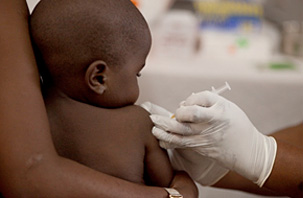- Added 16 May 2013
Uganda Virus Research Institute (UVRI)
Experience
UVRI is a well-recognised centre of excellence, and a central part of EDCTP's East African Network of Excellence (the East African Consortium for Clinical Research, or eaccr - www.eaccr.org). With extensive facilities across four research sites, and a headquarters closely tied with the country's MRC, the UVRI has strong experience in conducting high-quality clinical research.
Research interests
The institute is developing partnerships between public health professionals, clinical services, academia, industry, veterinary, wild life authorities and water service industry. Key partnerships have been developed with the Uganda Central Public Health Laboratories (CPHL), Makerere University School of Public Health (SPH), Ministry of Health (MOH), the Ministry of Agriculture Animal Industry and Forestry (MAAIF), Uganda Wildlife Authority (UWA), and the Ministry of tourism. UVRI is contributing to the Uganda national strategic policy planning and development particularly on HIV prevention, tourism, plague, vaccines; and maintaining and developing of further international networks. Examples of successful collaborations include UVRI’s partnerships with the U.S Centers for Disease Control (CDC), the British Medical Research Council (MRC), the Rakai Health Sciences program (RHSP), the International AIDS Vaccine Initiative (IAVI) the U.S. National Institutes of Health (NIH), the London School of Hygiene and Tropical Medicine (LSHTM), the European Development of Clinical Trials Program (EDCTP), and the East African Consortium of Clinical Research (EACCR). The Institute provides expert advice to specialist and general press using press conferences and releases and interacts with agencies and government departments within and outside Uganda.
Disease areas
- Dengue
- Enteric diseases
- HIV
- Influenza
- Malaria
- Neuro Infections
- Newborn Health
- Other
- Respiratory Diseases
- Sexually Transmitted Diseases (STDs)
Other information
UVRI has four research units at:
Entebbe (Headquarters)
Kampala
Masaka
Kyamulibwa
The Institute serves as a disease prevention, control and microbial epidemiology center. It is an agency for environmental health and protection and is always involved in emergency preparedness. In addition it serves as a national and international reference and specialized testing laboratory; is involved in regulation and policy development and quality improvement, conducts public health related research, provides expert advice, enables partnerships and communication and serves as a center for training and education.
UVRI provides reference microbiology and surveillance for viruses causing respiratory, liver diseases, polio, measles, rotavirus and yellow fever; and is involved in the detection of national outbreaks of measles, polio, hepatitis E, Marburg, Ebola, typhoid and nodding disease.
The Institute is also involved in the detection and monitoring of emerging and imported infectious diseases and antimicrobial resistances (including work on Ebola, Marburg, Avian influenza), search for new pathogens (carried by mosquitoes and ticks), supporting disease outbreak investigations, research on zoonoses plague, leptospirosis, anthrax; providing general and on-call support and expertise advice, supporting the introduction of immunization programmes, vaccine efficacy and vaccine coverage (rotavirus, childhood immunizable diseases), assisting in international surveillance and reference services support (especially work related to Avian influenza, arboviruses, polio, and measles), and carrying out seroepidemiology on HIV, HBV, HHV8, leptospirosis and other viruses.
The Institute is involved in research on zoonoses, especially plague; vector-borne infections, especially yellow fever; and environmental monitoring, particularly climatic change and relationship to acute febrile illnesses. The Institute has also carried out microbiological risk management in Maramagambo cave where bats were suspected to carry the Marburg virus.
The Institute is involved in infectious disease emergencies especially of VFH, plague, hepatitis E, and polio. We have participated in bio-terrorism response by examining anthrax outbreak in hippos and improving on the laboratory security of select agents. Together with partners we have drafted annual reviews of epidemics and outbreak contingency plans, mathematical models and scenario planning for HIV and Marburg.
The Institute is involved in typing of organisms especially Polio, Ebola, Rotavirus; confirming laboratory test results especially for Polio, HIV, Measles; sero-diagnosis for HIV, HBV, leptospirosis; identification of unusual or difficult and dangerous pathogens especially Ebola, and Marburg; antimicrobial resistance confirmation and mechanism determination particularly HIV drug resistance to ART; national and International Collections of blood products, node aspirates, urine collections, animal and bird tissues, excreta; and specialist in vivo and ex vivo assays especially arbovirus isolation and VHF.
UVRI contributes to national and international guidelines and policy development by contributing to research and health care guidelines. We have participated in national and international quality assurance schemes particularly on HIV testing, HIV drug resistance, Measles and Polio. The Institute is involved in development of biosafety and biosecurity standards, development of testing algorithms especially on HIV rapid testing, evaluation of diagnostic kits/tests/methods for HIV, rapid tests for plague and POC, development of new kits/tests in collaboration with partners, provision of assay controls and performance panels for HIV, assessment of new technologies for CD4 and Viral load, and the routine development of standard operating procedures.
The Institute is participating in the evaluation and development of diagnostic and reference technologies especially on new HIV test kits, plague rapid test kits, and Point of Care (POC); searching for new pathogens and antimicrobial resistance and mechanisms especially mosquitoes, ticks and HIV drug resistance; undertaking research and support the work of others in communicable diseases especially HIV, arboviruses, zoonoses, special pathogens; vaccine development and evaluation particularly HIV vaccines, and evaluations on Ebola and Marburg; epidemiology of rare and common pathogens especially Marburg, plague and HIV; sero-epidemiology and sero-prevalence studies mainly HIV, HBV, Human Herpes Virus sub type 8 (HHV8); and making mathematical models of the spread of infections particularly HIV and Marburg.
The Institute provides expert advice on clinical issues especially HIV patient care, microbiological advice on HIV drug resistance, VHF considered to be atypical malaria, technical advice on polio, measles labs and avian influenza, bio-safety infection control advice, outbreak advice to the Uganda Ministry of Health, districts, local leaders and the general public, and public health advice to policy makers, civic leaders and the public including the media.
Contact this site
To: Emily N Kabuye, project manager at Uganda Virus Research Institute (UVRI)
Please Login to contact a site.